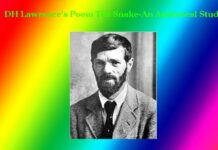Shakespeare | Sonnet No 151 | Critical Study
Shakespeare | Sonnet No 151 | Critical Study
Shakespeare | Sonnet No 151 | Critical Study
The greatest master of English literature, William Shakespeare has dealt with his ‘Sonnet No 151’ with the theme of physical love. His desire for a sexual relationship with his mistress, which means his paramour, is expressed in this sonnet. The poet gives not poetic but materialistic causes of his sexual desire for his mistress but the representation of this materialistic love is full of conceits which add poetic charm to this sonnet.
The poet says that love is so silly that it pays no attention to conscience. But it is love out of which conscience takes birth. So the poet addresses his mistress to be a fraud to the poet. As his mistress deceives the poet, so the poet expects to develop a sexual relationship with his mistress. The cause is that his mistress has already betrayed the poet. In response to the betrayal of his mistress, the poet wants to use his sexual limb against the honesty of his spirituality. Now his soul allows his flesh to ‘Triumph in Love’ which means he is inclined to quench his sexual desire. While the soul allows the poet to do so his flesh needs no further reason. Then the poet’s flesh ‘rises’ which means his sex organ enters into the organ of his mistress and this is regarded by the poet as his triumph over love for his mistress. The poet is proud of his sexual intercourse. And the poet is happy serving his mistress like a slave giving sexual pleasure to his mistress. The love expressed in this poem is sexual, not spiritual. Though his love is amorous, yet we cannot accuse the poet of being obscene, though there is no doubt there are elements of obscenity.
The language of this sonnet is not easy to understand as there are some words and phrases which are ambiguous. Such as “gross body” means the sexual organ “proud of this pride” the pride here means the poet’s sexual pleasure that he had with his mistress “rise and fall” the up and down of the sexual organ of the poet. 0 0 0
Read More: Robert Frost’s Poem ‘The Mending Wall’: An Analytical Study
Shakespeare | Sonnet No 151 | Critical Study
N. B. This article entitled ‘Shakespeare | Sonnet No 151 | Critical Study’ originally belongs to the book ‘World Poetry Criticism‘ by Menonim Menonimus. Shakespeare | Sonnet No 151 | Critical Study
Books of Literary Criticism by M. Menonimus:
- World Short Story Criticism
- World Poetry Criticism
- World Drama Criticism
- World Novel Criticism
- World Essay Criticism
- Indian English Poetry Criticism
- Indian English Poets and Poetry Chief Features
- Emily Dickinson’s Poetry-A Thematic Study
- Walt Whitman’s Poetry-A Thematic Study
- Critical Essays on English Poetry
- Tawfiq al-Hakim’s Novel: Return of the Spirit-An Analytical Study
- Tawfiq al-Hakim’s Novel: ‘Yawmiyyat Naib Fil Arayaf’-An Analytical Study
- Analytical Studies of Some Arabic Short Stories
- A Brief History of Arabic Literature: Pre-Islamic Period …
Related Searches:
- Sonnet 151 by William Shakespeare
- The Scholar’ by Robert Southey
- Robert Southey and His Poetry
- ‘To the Skylark’ by W. Wordsworth
- To the Skylark Summary and Study Guide
- A Robin Redbreast in a Cage











